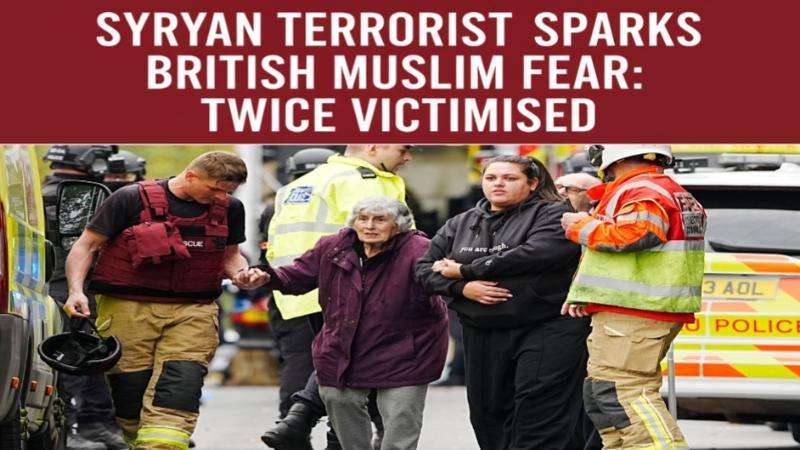HORROR ON HOLY DAY: British Citizen of Syrian Descent Named as Synagogue Terrorist– Greater Manchester Police (GMP) have identified the terrorist behind the deadly attack outside the Heaton Park Hebrew Congregation Synagogue on Yom Kippur as Jihad Al-Shamie, a 35-year-old British citizen of Syrian descent. Al-Shamie, who was shot dead by police, killed two men and seriously injured three others during a rampage on the Jewish community’s holiest day.
Details confirm Al-Shamie entered the UK as a young child and was naturalised as a British citizen in 2006. He allegedly drove a car at worshippers before launching a knife attack, wearing what appeared to be a suicide device, which police later deemed "not viable." Crucially, authorities confirmed that the attacker was not on the radar of the Prevent anti-terror and de-radicalisation programme, a detail that will fuel an intense review of national security protocols. The investigation continues, with three other individuals—two men in their 30s and a woman in her 60s—arrested on suspicion of terrorism offences.
Widespread Muslim Condemnation and the Shadow of Islamophobia-The perpetrator's identity as a British Muslim of Syrian origin has been met with immediate, overwhelming, and unreserved condemnation from UK Muslim communities, who now face the grim certainty of a severe public backlash.
Leaders across major Muslim bodies, including the British Muslim Trust and the British Muslim Network, have branded the attack as "utterly abhorrent" and "cowardly," unequivocally stating that antisemitism has no place in British society. The prominent British Bangladeshi community, a significant and well-integrated segment of the UK Muslim population, has been particularly vocal in expressing solidarity with the Jewish community and condemning the terrorist's actions. Community spokespersons have stressed the urgent need to prevent the attack from being used to falsely conflate the actions of a single extremist with the entire Muslim faith, fearing the violence will be exploited to deepen societal divisions.
The Fear: A New Peak in Anti-Muslim Hate-The community’s fear is not hypothetical. It is rooted in a well-documented pattern of collective punishment following every major terror incident linked to an individual of Muslim background.
Existing Vulnerability: Official data for the year ending March 2024 already positions Muslims as the most targeted religious group for hate crimes in England and Wales, accounting for nearly 40% of all religious hate crimes (3,866 reported cases).
The Spike: Historical evidence from the 7/7 London bombings and the 2017 terror attacks in Manchester and London shows that such events trigger a sizable and persistent spike in anti-Muslim hate crimes, sometimes quadrupling the daily rate in the immediate aftermath. Mosques and visible Muslim individuals, particularly women who wear religious attire, are often the primary targets of these reprisals, leading to an intensified sense of fear, isolation, and psychological trauma within the community.
Current Target: At this moment, with the background of a global conflict and this attack, Muslims and mosques are in the main target for hate in the UK, creating an atmosphere where British Muslims feel they are under suspicion simply for their identity.
Prime Minister Sir Keir Starmer has promised the Jewish community "more visible police presence" to protect them, while Home Secretary Shabana Mahmood has pledged to do "whatever is required" to keep them safe. However, Muslim community leaders are simultaneously pressing for equivalent, publicly visible measures to protect their communities from the anticipated wave of retaliatory Islamophobic attacks.
Daily Dazzling Dawn Analysis: The Double Weaponisation
The Manchester terror attack represents a devastating new low, specifically due to the "double weaponisation" of the perpetrator's identity.
Weaponisation Against Jews: The attack directly weaponised a twisted ideology against the Jewish community on their holiest day, aiming to maximise terror and pain.
Weaponisation Against Muslims: By being a British citizen of Syrian-Muslim descent, Al-Shamie's actions are immediately weaponised by Islamophobic narratives to cast suspicion on the entire British Muslim population. This act feeds the stereotype—often amplified in certain media and political circles—that British Muslims are a "fifth column" and an inherent security risk.
This dynamic places the loyal, peace-loving, and unequivocally condemnatory British Muslim community in the position of being twice victimised: first, by the shared horror of the terrorism itself, and second, by the subsequent surge in prejudice and targeted hate crime that they are left to endure alone. The long-term challenge for the UK is not only to defeat antisemitism but to prevent the extremist's intent—to divide communities—from succeeding by allowing Islamophobia to flourish as a consequence.



_2.jpg)
_3.jpg)



.svg)

